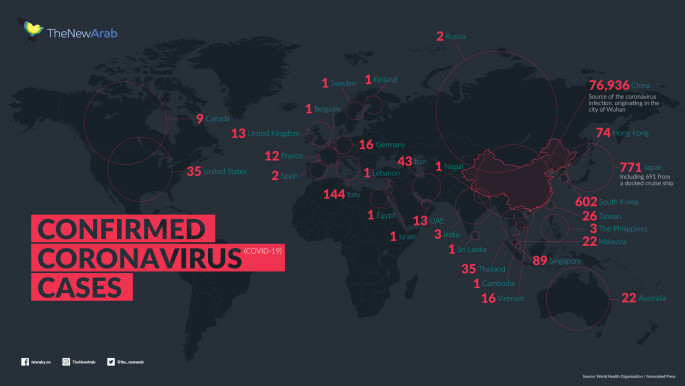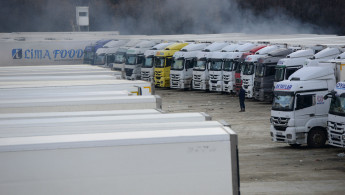Iran neighbours impose travel bans as coronavirus toll rises
Four immediate neighbours of the Islamic republic - Turkey, Pakistan, Afghanistan and Armenia - said on Sunday they would close land borders, while three imposed restrictions on air traffic, amid growing regional concerns about the spread of the virus.
Iraqi and Kuwaiti authorities have already banned travel to and from Iran.
Lebanon has confirmed its first case - a 45-year-old Lebanese woman who had travelled from Qom in Iran - and Israel on Sunday quarantined at home nearly 200 school pupils who came into contact with South Korean tourists who contracted the virus.
Iran reported three more novel coronavirus deaths Sunday among 15 new cases in the past 24 hours, taking its total number of fatalities to eight and infections to 43.
Four new COVID-19 cases surfaced in Tehran, seven in the holy city of Qom, two in Gilan and one each in Markazi and Tonekabon, health ministry spokesman Kianoush Jahanpour said.
Authorities have ordered the closure of schools, universities and other educational centres in 14 provinces across the country as a "preventive measure".
Art events, concerts and film shows have been banned for a week.
"We are on the frontlines, we need help," the head of Qom's medical sciences university, Mohammadreza Ghadir, said on state television.
'Major implications'
"To prevent the spread of the novel #coronavirus and protect the public, Afghanistan suspends all passenger movement (air and ground) to and from Iran," the office of the National Security Council of Afghanistan tweeted.
A provincial official in Pakistan and the nation's Frontier Corps, for their part, confirmed the country had sealed the land border with Iran.
Both Afghanistan and Pakistan share long, porous borders with Iran that are often used by smugglers and human traffickers, while millions of Afghan refugees live in the Islamic republic - raising fears that the virus could easily spread over the border.
Read More: Could coronavirus impact oil markets?
Turkey said it would "temporarily" close its land border with Iran, while air traffic from Iran would be halted but departures to the country continue.
Late on Sunday, Armenia's Prime Minister Nikol Pachinian announced his country was both suspending flights and entry via the sole land border checkpoint with Iran.
China - the epicentre of the outbreak - reported another 97 deaths in its daily update Sunday, taking its total to 2,442, plus 648 new infections.
Nearly 80,000 people have been infected worldwide, the vast majority in China.
But official figures indicate the death rate is proportionately much higher in Iran than China, standing at nearly one in five of the confirmed infections.
Iran's Health Minister Saeed Namaki said the treatment of COVID-19 cases would be free.
"In every city, one hospital will be dedicated to treating coronavirus cases," he said, adding that this number would be greater in bigger cities like Tehran.
But academics expressed concern over the ability of Iran - currently grappling with a major economic crisis and hit by swingeing US sanctions - to contain the outbreak.
"It is unlikely that Iran will have the resources and facilities to adequately identify cases and adequately manage them if case numbers are large," said Paul Hunter, a medical professor at Britain's University of East Anglia.
He also noted that the region was already grappling with multiple conflicts.
"During armed conflicts, borders between countries become porous... and health care facilities are often targeted and destroyed," he said.
Other regional countries on Sunday also took major precautionary measures to counter the virus potentially spreading from Iran.
Jordan said it would bar entry to citizens of China, Iran and South Korea and other foreigners travelling from those countries.
The Kuwait Port Authority, meanwhile, announced a ban on the entry of all ships from the Islamic republic.






 Follow the Middle East's top stories in English at The New Arab on Google News
Follow the Middle East's top stories in English at The New Arab on Google News
![The UAE is widely suspected of arming the RSF militia [Getty]](/sites/default/files/styles/image_330x185/public/2024-11/GettyImages-472529908.jpg?h=69f2b9d0&itok=Yauw3YTG)
![Netanyahu furiously denounced the ICC [Getty]](/sites/default/files/styles/image_330x185/public/2024-11/GettyImages-2169352575.jpg?h=199d8c1f&itok=-vRiruf5)
![Both Hamas and the Palestinian Authority welcomed the ICC arrest warrants [Getty]](/sites/default/files/styles/image_330x185/public/2024-11/GettyImages-2178351173.jpg?h=199d8c1f&itok=TV858iVg)